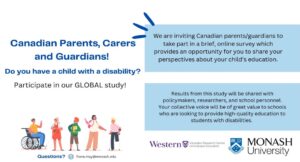In 2005, the Ontario government passed a law called the Accessibility for Ontarians with Disabilities Act (AODA). Its purpose is to improve accessibility for people with disabilities. The goal is full participation in Ontario’s society.
Right now, there are AODA regulations that set minimum standards for information and communication, employment, transportation, design of public spaces, and customer service. After sustained effort by the AODA Alliance, the province struck a committee to propose standards, to be called the Education Accessibility Standard, for students with disabilities from kindergarten to grade 12. That committee finished its draft in March of this year. The consultation period for feedback on the draft standards ended November 1, 2021.
Inclusion Action in Ontario submitted its comment on October 30, 2021. Our main take aways are the following:
- We support the committee’s view that Universal Design for Learning is criticial to achieving barrier free education. This must be for ALL learners. No exceptions. Right now, if it is implemented at all, it is generally not implemented properly or with all learners in mind, particularly those with intellectual or developmental disabilities. Those students are instead directed to segregated classrooms and alternative curricula as a general rule.
- The standard currently proposes the entrenchment and expansion of alternative curriculum. IAO strongly rejects this proposal as it creates structural barriers by explicitly designating disabled students as incapable of using the same curriculum as non-disabled peers. IAO has instead recommended that the general education curriculum should be the default curriculum for all students, in line with current research.
- Wider reform is necessary: the Education Act regulations must move away from labels and special education classrooms and towards accessibility and accommodation of disability, to ensure the best possible outcomes. Decades of segregated options using special education classrooms has not resulted in the outcomes we would have hoped for, particularly for our most vulnerable learners. We support the committee’s recommendations that the Identification, Placement and Review Committee system should be reviewed to determine if it needs to be re-designed, retained or replaced. This is fully in-line with recent research and commentary which demonstrates this system can be traced back to the institutionalization of persons with disabilities. This system is antithetical to both Universal Design for Learning and the Human Rights Code, which establishes the duty to accommodate.
- The Individual Education Plan needs to be reimagined as inclusive and competency based, drawing on the work of Shelley Moore in British Columbia. Doing so also means meaningfully including the students themselves in the development and implementation of their IEPs. It can also mean including peers. Typically, this process is directed by school staff with some input from families, but not the student or their peers. Many students today do not even know they have IEPs. Students need to be meaningfully engaged in their own learning and IEPs or they will not be invested. IEPs must also be used as a means of improving social capital for our most vulnerable students to ensure their meaningful inclusion in school and society. IEPs do not get us there today.
IAO’s full submission can be downloaded as a PDF here and a word document here.

